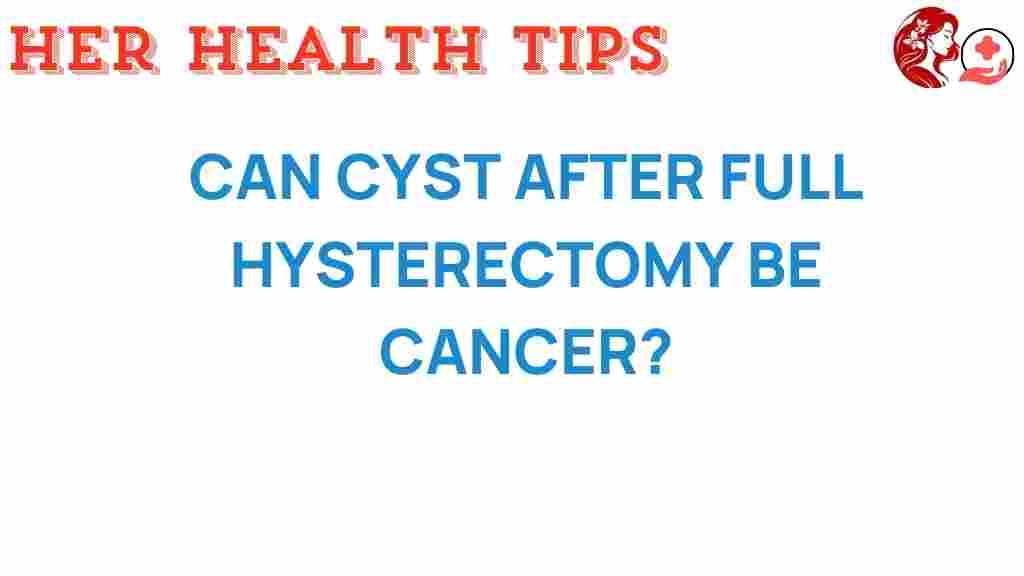Cysts, Hysterectomy, Cancer: Understanding the Connection
Undergoing a hysterectomy is a significant step in a woman’s health journey, often taken to address various medical conditions. However, many women are concerned about the possibility of developing cysts post-hysterectomy and whether these cysts could indicate cancer. In this comprehensive article, we will unravel the mystery surrounding cysts after hysterectomy, exploring their symptoms, diagnosis, treatment options, and risk factors while providing essential medical advice.
What Are Cysts?
Cysts are fluid-filled sacs that can develop in various parts of the body, including the ovaries, breasts, and skin. They are relatively common and can vary in size and type. In the context of women’s health, ovarian cysts are particularly relevant, especially after a hysterectomy.
Types of Cysts
There are several types of cysts that women may experience:
- Functional Cysts: These are the most common type and often form during the menstrual cycle. They usually resolve on their own.
- Dermoid Cysts: These are made up of various types of tissues, including hair and skin, and may require surgical removal.
- Endometriomas: These cysts are associated with endometriosis and can cause pain and other symptoms.
- Polycystic Ovary Syndrome (PCOS): This condition involves multiple cysts forming in the ovaries and can affect hormone levels.
Understanding Hysterectomy
A hysterectomy is a surgical procedure that involves the removal of the uterus. Depending on the reason for the surgery, it may also include the removal of the cervix, ovaries, and fallopian tubes. Common reasons for undergoing a hysterectomy include:
- Uterine fibroids
- Heavy menstrual bleeding
- Endometriosis
- Pelvic pain
- Cancer or precancerous conditions
Post-Hysterectomy Changes
After a hysterectomy, women may experience hormonal changes, especially if the ovaries are removed. This can lead to various symptoms, including:
- Hot flashes
- Night sweats
- Vaginal dryness
- Changes in mood
Can Cysts After Hysterectomy Indicate Cancer?
The development of cysts after a hysterectomy can understandably raise concerns about cancer. However, it’s important to know that not all cysts are cancerous. Here’s a breakdown of the relationship between cysts and cancer:
When to Be Concerned
While most cysts are benign, certain symptoms and risk factors may warrant a closer examination:
- Persistent abdominal or pelvic pain
- Changes in bowel or bladder habits
- Unexplained weight loss
- Abnormal vaginal bleeding
- Family history of ovarian or breast cancer
Diagnosis of Cysts and Cancer
If you experience concerning symptoms, it’s vital to consult a healthcare professional. Diagnosis may involve several steps:
- Physical Examination: Your doctor will assess your symptoms and perform a pelvic exam.
- Imaging Tests: Ultrasound or CT scans can help visualize the cysts and other pelvic structures.
- Blood Tests: CA-125 is a blood test often used to evaluate ovarian cancer risk, although elevated levels can also occur in benign conditions.
Symptoms of Cysts That May Indicate a Problem
While many cysts are asymptomatic, some may present symptoms that should not be ignored:
- Severe abdominal pain
- Pelvic pain during intercourse
- Continuous bloating or pressure
- Changes in menstrual cycle
Treatment Options for Cysts
Treatment for cysts often depends on various factors, including the type of cyst, symptoms, and whether there are signs of malignancy. Here are common treatment options:
Watchful Waiting
In many cases, especially with functional cysts, a healthcare provider may recommend a wait-and-see approach. Many cysts resolve on their own.
Medications
Hormonal contraceptives may be prescribed to help regulate the menstrual cycle and prevent the formation of new cysts.
Surgical Options
If a cyst is large, persistent, or suspected to be cancerous, surgical intervention may be necessary. This could involve:
- Cystectomy: Removal of the cyst while preserving the ovary.
- Oophorectomy: Removal of the ovary, usually in cases of serious concern.
- Hysterectomy: In some cases, a hysterectomy may be needed if cancer is confirmed or suspected.
Risk Factors for Developing Cysts After Hysterectomy
Some women may be more prone to developing cysts post-hysterectomy based on certain risk factors:
- Age: Women in their reproductive years are more likely to develop cysts.
- Hormonal Imbalances: Conditions like PCOS can increase the likelihood of cyst formation.
- Family History: A family history of ovarian or breast cancer may increase risk.
- Previous Ovarian Issues: A history of ovarian cysts or endometriosis can contribute to future cyst development.
Medical Advice and When to Seek Help
If you have undergone a hysterectomy and are experiencing symptoms such as persistent pain or changes in your menstrual cycle, it’s essential to seek medical advice. Early diagnosis and intervention can be crucial in managing your health.
Always consult your healthcare provider for personalized medical advice. They will consider your medical history, current symptoms, and any risk factors before recommending appropriate action.
For more information about women’s health and hysterectomy, you can visit WomensHealth.gov.
Troubleshooting Tips for Managing Symptoms
While navigating post-hysterectomy life, here are some troubleshooting tips to help manage symptoms related to cysts:
- Maintain a Healthy Lifestyle: Regular exercise and a balanced diet can help manage symptoms and overall health.
- Track Your Symptoms: Keeping a journal of symptoms can help you and your doctor identify patterns and triggers.
- Stay Informed: Educate yourself about cysts and their implications for women’s health.
- Communicate with Your Doctor: Open communication about changes in your health is vital for receiving the best care.
Conclusion
In conclusion, while cysts can develop after a hysterectomy, they do not automatically indicate cancer. Understanding the types of cysts, their symptoms, and when to seek medical advice is crucial for women’s health. Always consult your healthcare provider for diagnosis and treatment options tailored to your individual needs. By staying informed and proactive, you can effectively manage your health after a hysterectomy.
This article is in the category Conditions and created by HerHealthTips Team
